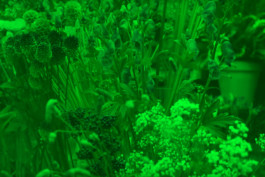



scroll
↓
For thousands of years, human beings have worked to separate themselves from nature. Seeing things from an anthropocentric perspective has led to humanity positioning itself as a species apart, wielding dominion over a planetary system causing the estrangement to grow ever wider.
The organisms that cohabit planet Earth form a rich and generous ecosystem, providing habitats, producing food and creating oxygen. Yet, In the context of climate crisis, post-industrialization, techno-capitalism and global pandemics it is important that we do not simplify notions and attitudes towards ‘nature’ as simply a positive force, or another opportunity to be exploited by the human race.
Instead we seek to understand the place of humans within nature, alongside bacteria, elephants, soil and oceans. We believe that looking backwards can help shape and nuance our views and notions of nature for the future, and bring this into our work to demonstrate both the creative, positive forces and potential harms that could arise from new types of interactions, new opportunities for symbiosis, between the species.
Through Grow Your Own Cloud, we imagine what the world might be like if humans saw themselves as part of nature once again. To understand the true value of the ecosystems that have formed over millions of years and the underlying technologies inherent in the biological systems around us.

Through our work, we want to change the way humans consider nature and technology. Can technology become a living organism in a wider ecosystem of the Earth? Can we shift from models of technology that exploit the Earth's resources, to regenerative models?
While we know much about the organic world, there remain huge mysteries. Plants for example are extremely enigmatic organisms, holding many secrets and possessing amazing qualities. Amongst these attributes is the fact that while plants may appear simple to the untrained eye, the largest known genomes on Earth belongs to Paris Japonica, with 149 billion base pairs - 50x the size of the human genome. This means that despite their apparent modesty, their DNA structure holds a lot more information than any human.
All this information or data, means that plants have the potential to store huge amounts of data within their DNA. At Grow Your Own Cloud, we are interested in exploring the natural data storage properties of plants, as well as the numerous potential ways to store and treat data in a more meaningful way. We work with the natural properties of organisms, to develop methods which encourage interspecies collaboration, through data archiving.
In the case of plants, we help educate people on how they might carefully take care of their plants in order to protect data integrity, keep it secure, as well as nurture the plant. This in turn helps improve plant growth, mortality rates, while ensuring that data is not lost prematurely.

For thousands of years, human beings have worked to separate themselves from nature. Seeing things from an anthropocentric perspective has led to humanity positioning itself as a species apart, wielding dominion over a planetary system causing the estrangement to grow ever wider.
The organisms that cohabit planet Earth form a rich and generous ecosystem, providing habitats, producing food and creating oxygen. Yet, In the context of climate crisis, post-industrialization, techno-capitalism and global pandemics it is important that we do not simplify notions and attitudes towards ‘nature’ as simply a positive force, or another opportunity to be exploited by the human race.
Instead we seek to understand the place of humans within nature, alongside bacteria, elephants, soil and oceans. We believe that looking backwards can help shape and nuance our views and notions of nature for the future, and bring this into our work to demonstrate both the creative, positive forces and potential harms that could arise from new types of interactions, new opportunities for symbiosis, between the species.
Through Grow Your Own Cloud, we imagine what the world might be like if humans saw themselves as part of nature once again. To understand the true value of the ecosystems that have formed over millions of years and the underlying technologies inherent in the biological systems around us.

Through our work, we want to change the way humans consider nature and technology. Can technology become a living organism in a wider ecosystem of the Earth? Can we shift from models of technology that exploit the Earth's resources, to regenerative models?
While we know much about the organic world, there remain huge mysteries. Plants for example are extremely enigmatic organisms, holding many secrets and possessing amazing qualities. Amongst these attributes is the fact that while plants may appear simple to the untrained eye, the largest known genomes on Earth belongs to Paris Japonica, with 149 billion base pairs - 50x the size of the human genome. This means that despite their apparent modesty, their DNA structure holds a lot more information than any human.
All this information or data, means that plants have the potential to store huge amounts of data within their DNA. At Grow Your Own Cloud, we are interested in exploring the natural data storage properties of plants, as well as the numerous potential ways to store and treat data in a more meaningful way. We work with the natural properties of organisms, to develop methods which encourage interspecies collaboration, through data archiving.
In the case of plants, we help educate people on how they might carefully take care of their plants in order to protect data integrity, keep it secure, as well as nurture the plant. This in turn helps improve plant growth, mortality rates, while ensuring that data is not lost prematurely.